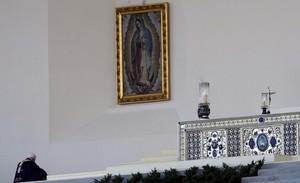An excerpt of the Pope’s homily delivered early today in Mexico. What does it mean to be pure of heart? Why do I want a purity of heart?
“A pure heart, create for me, O
God” (Ps 50:12) during the responsorial psalm. This exclamation shows us
how profoundly we must prepare to celebrate next week the great mystery of the
passion, death and resurrection of the Lord. It also helps us to look deeply
into the human heart, especially in times of sorrow as well as hope, as are the
present times for the people of Mexico and of Latin America.
God” (Ps 50:12) during the responsorial psalm. This exclamation shows us
how profoundly we must prepare to celebrate next week the great mystery of the
passion, death and resurrection of the Lord. It also helps us to look deeply
into the human heart, especially in times of sorrow as well as hope, as are the
present times for the people of Mexico and of Latin America.
The desire for a
heart that would be pure, sincere, humble, acceptable to God was very much felt
by Israel as it became aware of the persistence in its midst of evil and sin as
a power, practically implacable and impossible to overcome. There was nothing
left but to trust in God’s mercy and in the hope that he would change from
within, from the heart, an unbearable, dark and hopeless situation. In this way
recourse gained ground to the infinite mercy of the Lord who does not wish the
sinner to die but to convert and live (cf. Ez 33:11). A pure heart, a new
heart, is one which recognizes that, of itself, it is impotent and places
itself in God’s hands so as to continue hoping in his promises. Then the
psalmist can say to the Lord with conviction: “Sinners will return to
you” (Ps 50:15). And towards the end of the psalm he will give an
explanation which is at the same time a firm conviction of faith: “A
humble, contrite heart you will not spurn” (v. 19).
heart that would be pure, sincere, humble, acceptable to God was very much felt
by Israel as it became aware of the persistence in its midst of evil and sin as
a power, practically implacable and impossible to overcome. There was nothing
left but to trust in God’s mercy and in the hope that he would change from
within, from the heart, an unbearable, dark and hopeless situation. In this way
recourse gained ground to the infinite mercy of the Lord who does not wish the
sinner to die but to convert and live (cf. Ez 33:11). A pure heart, a new
heart, is one which recognizes that, of itself, it is impotent and places
itself in God’s hands so as to continue hoping in his promises. Then the
psalmist can say to the Lord with conviction: “Sinners will return to
you” (Ps 50:15). And towards the end of the psalm he will give an
explanation which is at the same time a firm conviction of faith: “A
humble, contrite heart you will not spurn” (v. 19).
The history of Israel relates some great events and battles, but when faced with its more authentic existence, its decisive destiny, its salvation, it places its hope not in its own efforts, but in God who can create a new heart, not insensitive or proud. This should remind each one of us and our peoples that, when addressing the deeper dimension of personal and community life, human strategies will not suffice to save us. We must have recourse to the One who alone can give life in its fullness, because he is the essence of life and its author; he has made us sharers in the same through his Son Jesus Christ.
Today’s Gospel takes up the topic and shows us how this ancient desire for the fullness of life has actually been achieved in Christ. Saint John explains it in a passage in which the wish of some Greeks to see Jesus coincides with the moment in which the Lord is about to be glorified. Jesus responds to the question of the Greeks, who represent the pagan world, saying: “Now the hour has come for the Son of Man to be glorified” (Jn 12:23). This is a strange response which seems inconsistent with the question asked by the Greeks. What has the glorification of Jesus to do with the request to meet him? But there is a relation. Someone might think – says Saint Augustine – that Jesus felt glorified because the Gentiles were coming to him. This would be similar to the applause of the multitudes who give “glory” to those who are grand in the world, as we would say today. But this is not so. “It was convenient that, before the wonder of his glorification, should come the humility of his passion” (In Joannis Ev. 51:9: PL 35, 1766).
